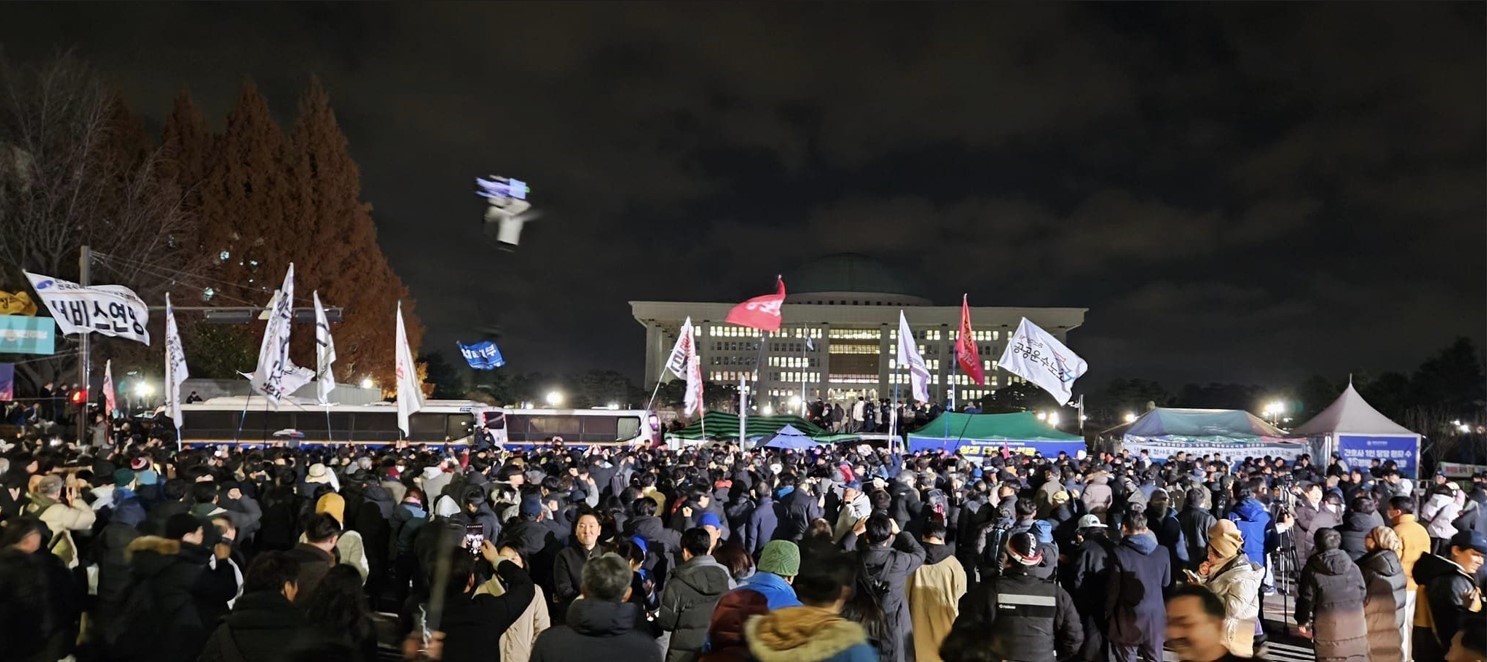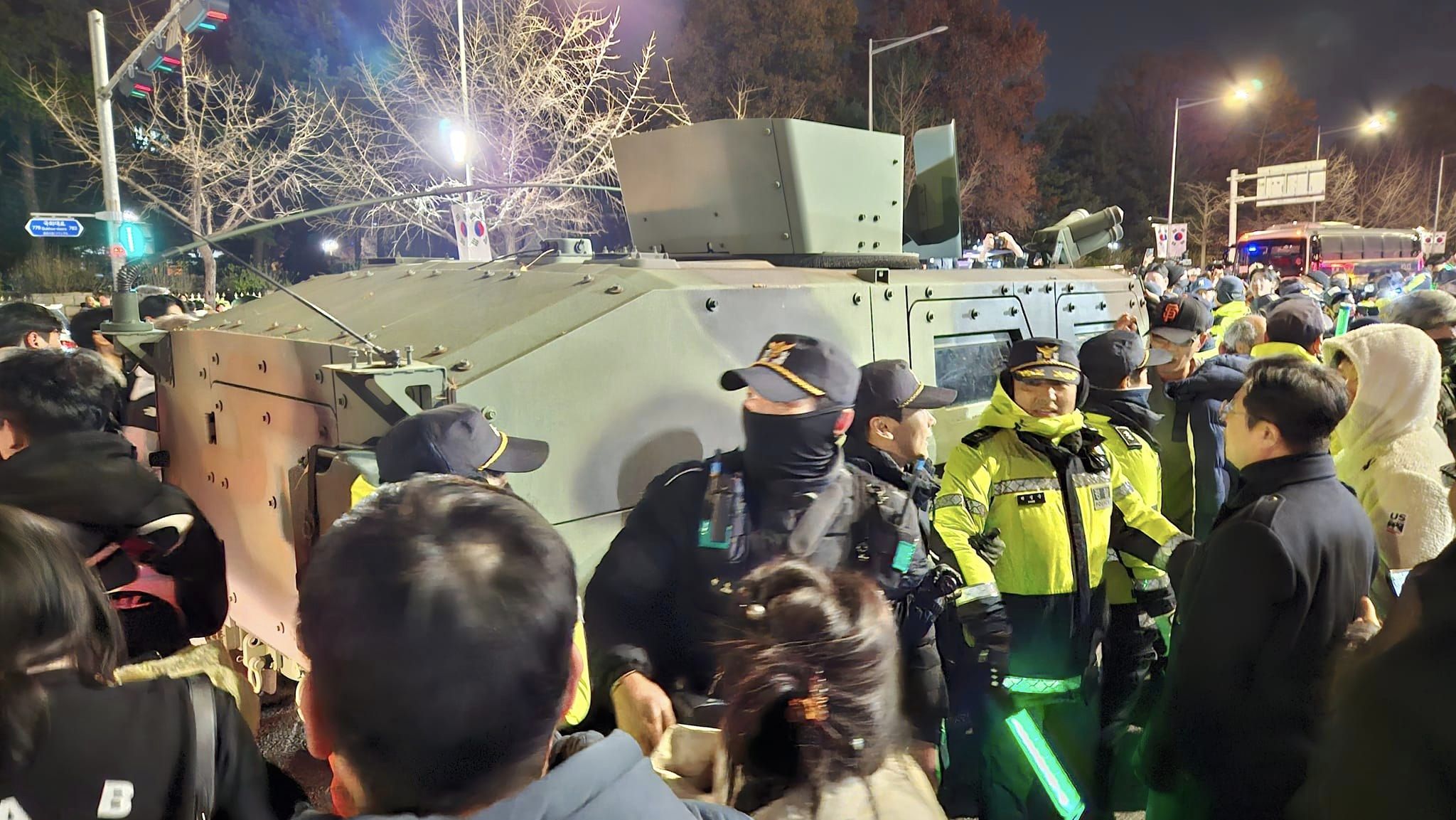
Yoon Suk-yeol, South Korea’s right-wing president, tried to emulate previous dictatorial leaders, such as Park Chung-hee and Chun Doo-hwan, to maintain his power through the implementation of martial law. But he failed within just six hours, because the Korean people rose up against him resolutely.
On December 3, at about 10.30pm in Seoul, Yoon shocked South Koreans by declaring martial law in a speech that was televised nationwide. Yoon used the excuse that he needed to eradicate “anti-state forces” who are “pro-North Korea”, but no one in South Korea believed his excuse, including the leaders of his own ruling party, as this action was clearly Yoon’s desperate attempt to hold onto power, which is increasingly being challenged.
This was the first declaration of martial law in 45 years in South Korea. Military forces were deployed to block the building of the National Assembly (South Korea’s parliament), with helicopters hovering in the air and tanks occupying the streets of the capital, Seoul.
Military authorities under martial law issued orders to prohibit all political activities, including National Assembly meetings, street demonstrations, strikes and so on. All media were also subject to the control of the Martial Law Order. However, this did not stop South Koreans from taking to the streets of Seoul to protest the attempted coup by the president.
Military forces broke into the National Assembly building and attempted to enter the main conference hall, but were prevented by parliamentary officers who sprayed them with fire extinguishers. Angry Koreans also gathered outside the National Assembly building to defend democracy. A confrontation broke out between protesters and security forces at the main entrance.
Koreans protesting in the streets chanted slogans such as “Abolish martial law!”, and sang “March for the Beloved”, a democratic struggle song born out of the Gwangju People’s Uprising in 1980. Protests also broke out in Gwangju, where many Koreans cannot forget what happened there 44 years ago.
korea04.jpg

Overturned
About two hours later, at 1am, on December 4, 190 of the 300 members of parliament were able to enter the conference hall of the National Assembly and vote unanimously to repeal martial law.
All major political parties, including the ruling People’s Power Party of which Yoon is a member, opposed martial law. People’s Power Party leader Han Dong-hoon said: “The declaration of martial law by the president is wrong. We will stop it with the people.”
Lee Jae-myung, leader of the Democratic Party, the centrist opposition party that controls the most seats in the National Assembly, called on Koreans to gather in large numbers at the National Assembly.
The Korean Confederation of Trade Unions (KCTU) protested Yoon’s anti-democratic actions. “Martial law is a tool used by the dictatorial governments of Park Chung-hee and Chun Doo-hwan to destroy democracy and human rights in order to extend their power. It is a step that has not been taken for 44 years since our society achieved at least a formal democratic system,” said a statement issued by the KCTU shortly after the declaration of martial law. “Faced with his own power crisis, Yoon Suk-yeol has essentially conceded his anti-democratic dictatorial rule through this irrational and anti-democratic legal move.”
“The people will not forgive this. They remember the fate of the regimes that once declared martial law,” the KCTU said. “The people clearly remember the end of the regimes that deceived the people and damaged democracy. The people never forgive regimes that oppress the people and violate democracy.
“The Yoon Suk-yeol regime has declared the end of its own power. The declaration of the law is actually the declaration of the end of the Yoon regime,” KCTU added. “All citizens and people of this land, including the Confederation of Korean Trade Unions, will declare the termination of Yoon Suk-yeol through this martial law. Now this is the end of Yoon Suk-yeol.”
As a result of the determination of South Koreans to defend democracy in the country, Yoon announced that he would lift the emergency law in another television broadcast at about 4.30am. The Cabinet approved the motion to revoke martial law shortly after — only six hours after its declaration.
korea01.jpg

Resign!
Following the cancellation of martial law, voices demanding the dismissal of Yoon as president are getting louder.
The Democratic Party announced that they would begin proceedings to impeach Yoon if he refused to resign. After an emergency meeting by lawmakers from the Democratic Party at the National Assembly, they announced that the declaration of martial law violated the constitution and was an act of serious treason and a strong reason for Yoon’s dismissal. Opposition parties control 192 of the 300 seats in the National Assembly, so they need the support of parliamentarians from the ruling party to get a two-thirds majority vote for the legislation to impeach the President.
Yoon, a right-wing and conservative politician, was elected in 2022, with a political program promising a tougher stance against North Korea. Yoon was the chief prosecutor before he ran for president. He was the chief prosecutor who convicted Park Geun-hye, the president who was ousted in 2017 due to massive public protests.
Yoon won the presidential election in 2022 with only 48.56% of the vote and a slim margin of less than 250,000 votes. Support for Yoon’s presidency has been declining since he took power, due to his failure to deal with economic problems and also a scandal involving his wife.
The determination of the people in defending democracy and rejecting authoritarian rule has crushed Yoon’s attempted coup through the declaration of martial law. This was a critical victory for the people against the increasingly unpopular, right-wing, war-mongering regime.
It seems that the people’s movement will continue to push for the overthrow of the Yoon Suk-yeol regime in order to avoid another surprise coup attempt. If Yoon is ousted, he would be the second president to suffer such a fate since South Korea transitioned to a formal democracy in 1987. Park Geun-hye, a right-wing politician who is the daughter of dictator Park Chung-hee, was ousted from the presidency of South Korea in 2017 after a massive wave of popular protests in the country.
[Translated from the Malaysian Socialist Party’s online publication sosialis.net, where this article first appeared.]